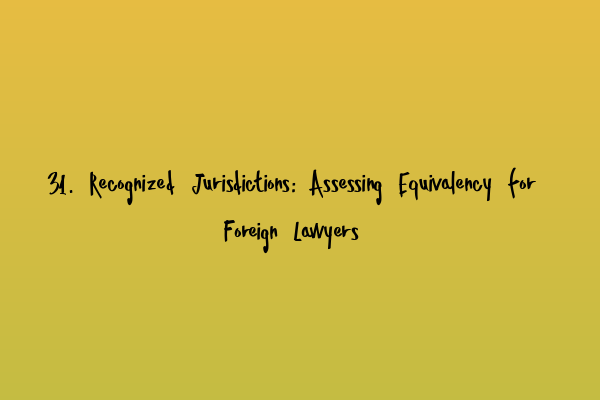Recognized Jurisdictions: Assessing Equivalency for Foreign Lawyers
As the legal landscape becomes increasingly globalized, the recognition of foreign lawyers and their qualifications is a vital consideration for many legal professionals. In the United Kingdom, the Solicitors Regulation Authority (SRA) has established a framework for assessing the equivalency of foreign qualifications, known as the Recognized Jurisdictions regime. In this article, we will explore the process of assessing equivalency for foreign lawyers and the importance of being qualified to practice law in the UK.
Understanding Recognized Jurisdictions
The SRA has designated certain jurisdictions as ‘Recognized Jurisdictions’, meaning that lawyers qualified in those jurisdictions are eligible to undertake the Solicitors Qualifying Examination (SQE) and potentially practice law in the UK. The purpose of the Recognized Jurisdictions regime is to ensure that foreign lawyers meet the necessary standards of knowledge and skills required to practice law in the UK.
When assessing the equivalency of foreign qualifications, the SRA considers various factors including the educational requirements, professional experience, and regulatory standards of the foreign jurisdiction. It is important for foreign lawyers seeking recognition in the UK to familiarize themselves with the specific requirements of the Recognized Jurisdiction that they are qualified in.
The SQE as an Assessment Tool
The SQE is a two-part examination designed to assess the knowledge and skills necessary to practice law in England and Wales. For foreign lawyers, passing the SQE is a key step in demonstrating equivalency to the UK’s legal standards. The first part of the examination, SQE1, tests candidates on their practical legal knowledge and application, while the second part, SQE2, assesses practical legal skills.
Preparing for the SQE can be challenging, but there are resources available to help foreign lawyers navigate the examination process. SQE 1 Practice Exam Questions and SQE 1 Practice Mocks FLK1 FLK2 are valuable tools for familiarizing yourself with the types of questions you may encounter on the examination.
Additional Requirements for Foreign Lawyers
In addition to passing the SQE, foreign lawyers must also meet certain eligibility criteria in order to practice law in the UK. These criteria include, among others, demonstrating proficiency in English language skills and fulfilling any additional requirements stipulated by the SRA for their jurisdiction. It is essential to carefully review the specific requirements for your jurisdiction to ensure compliance.
When preparing for the SQE and assessing equivalency for foreign lawyers, it is beneficial to consider expert guidance and support. SQE 2 Preparation Courses and SQE 1 Preparation Courses offer comprehensive training and resources to help foreign lawyers achieve success in their qualification journey.
Stay Informed with Important Dates
Keeping track of important dates is crucial when undertaking the process of assessing equivalency and preparing for the SQE. The SRA regularly updates the examination schedule, including registration deadlines and examination dates. To stay informed of the latest SRA SQE exam dates, refer to the following link: SRA SQE Exam Dates.
Conclusion
As the legal profession continues to globalize, the recognition of foreign lawyers and their qualifications plays an increasingly important role. Understanding the process of assessing equivalency for foreign lawyers, familiarizing oneself with the Recognized Jurisdictions regime, and undertaking the SQE examination are key steps in pursuing a successful legal career in the UK. By staying informed, seeking expert guidance, and utilizing available resources, foreign lawyers can navigate the process of equivalency assessment and position themselves for success.
